新概念第一册自学导读Lessons49-50
新概念第一册Lesson49-50

tell sb to do sth. 告诉某人做某事 1.Tom的妈妈告诉他去清洁卧室。 Tom's mom tells him to clean the bedroom. 2.我的姐姐告诉我去买一些牛排。 My sister tells me to buy some steak.
3.老师告诉我们去做我们的家庭作业。 The teacher tells us to do our homework. 4.她的妈妈告诉她不要看电视。 Her mother tells her not to watch TV.
eg. The teacher tell you to remember this sentence. You should tell him to clean the floor.
1. 我妈妈叫我去做作业。 eg. My mother tell me to do the homework.
tell sb not to do sth. 告诉某人不要做某事 eg. My father tell me not to play the computer
Text
• BUTCHER: Do you want any meat today, Mrs.Bird?
• MRS. BIRD: Yes, please. • BUTCHER: Do you want beef or lamb? • MRS. BIRD: Beef,please. • BUTCHER: This lamb's very good. • MRS. BIRD: I like lamb, but my
1.我要给孩子们讲这个故事。 eg. I will tell the children this story.
新概念第一册49-50
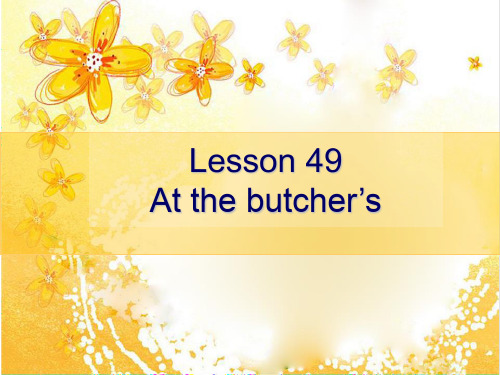
★ butcher n. a person who sells meat
e.g.: The old man is a butcher .
at the butcher's 在肉店 a place where you can buy meat
eg: The boy is at the butcher's . He wants to buy some meat .
1.▲ speak作及物动词,意为“说”“讲”,其宾语 常是某种语言。如:speak French说法语; 2.表示说到什么人或事,须用介词about/ of /on引出 的短语。如:They all spoke on folk music. 3.speak也作不及物动词,主要表示说话的本能和方 式,发言等。例如: The baby is learning to speak. speak+ 语言 speak of 意为“提到、说起” speak to sb对某人讲话
▲tell意为“告诉,对…说”.告诉的内容 可以和to连用 作及物动词,如: I can’t tell the bad news to you. =I can’t tell you the bad news. My mother tells me to buy some fruit. tell the truth 说真话 tell a lie说谎 tell the time “报时“ tell a story讲故事 tell about a person / a game / a success tell sb. sth./ tell sth. to sb. tell sb. to do sth. tell : 辨别,说出区别 tell A from B tell the differences between A and B
新概念一 L49-50
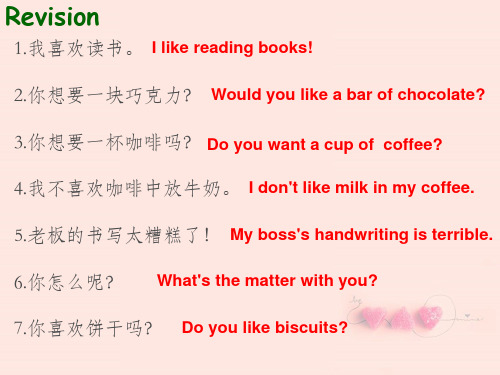
To tell you the truth, Mrs. Bird, I don’t like chicken either!
1)tell v. 告诉 tell sb sth 告诉某人某事 tell sb to do sth. 告诉某人做某事
~ the time in English 用英语报时 ~ a lie 撒谎 ~ the truth 说实话 2)truth n.实情 true adj.真实的
疑问句
借助助动词提问do/does Do / Does + 主语+动词~
你每天说英语吗? Do you speak English every day? (主语为 I, you及复数时, 助动词用do)
他每天说英语吗 ? Does he speak English every day?
(主语为第三人称单数时,助动词用do)
在英文表示“某一商店”的商店中, 往往可以把shop省略
eg . at the hairdresser’s (shop) 理发店
lamb [læ m] n. 羊羔[C];羔羊肉[U]
e.g: 你想要些羔羊肉吗?
Would you like some lamb?
农场里有几只羔羊?
How many lambs are there on the farm?
选择疑问句( …or…)
你想要一个苹果还是一个香蕉呢? Do you want an apple or a banana ? An apple please! /A banana,please!
Truth or dare! 真心话大冒险(a game)
To be or not to be, that’s a question. 生存还是毁灭?这是个问题。
新概念Lesson 49-50

restaurant library
She is a butcher. at the butcher's
the doctor's the hairdresser's
Do you want any meat ? mince
beef chicken
lamb steak
1.beef
cow
ox
2.steak
a piece of steak
steak rare 三分熟 medium 五分熟
well done 全熟 medium well 七分熟
I like beef steak,too. I don't like lamb steak,either.
Mrs.Bird went to the butcher's to buy meat.
Let's listen and answer the questions.
Listening
1.Mrs.Bird likes lamb. Yes
2.Mrs.Bird's husband like lamb too. No.
5.Do you agree or not? .Do you agree or not?
I like lamb,but my husband doesn't(like lamb).
用but连接的并列句,在后一分句中可以省略与前一分 句中相同的谓语动词和宾语。
填空.
He likes coffee,but I __d_o_e_s_n_'_t _____. She likes tea,but he __d_o_e_s_n_'_t _____. He is eating some bread,but she____i_s_n_'t_______. She can type very well,but he ___c_a_n_'t_________. They are working hard,but we __a_r_e_n_'_t _____. He is reading a magazine,but I __a_m___n_o_t _____.
新概念第一册第49-50课
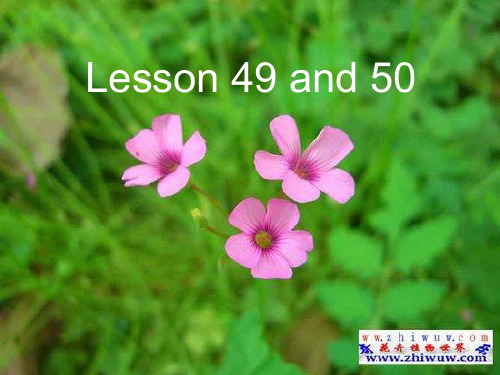
Have you ever been there?
butcher
---Do you eat meat every day? 你每天都吃肉吗? --- I like meat very much
Lesson 49 At the butcher‟s
New Words and Expressions
She's as gentle as a lamb. A lamb is as dear to a poor man as an ox to the rich. 穷人的一只羔羊比富人的一头 牛还要珍贵。
mince
n. (UC)
I want a pound of mince. Because I want to make some dumplings .
C
练习二:选用 say speak talk tell的适当形式 填空。 says 1. He ____ he is busy. speak 2.What language do you __ ____﹖” speak Chinese.″ ″I ______ talking loudly to the 3. The teacher is ____ students. talking/discussing 4. She is ____ ________ with her classmates. tell me the news. 5. Please ___
练习一:
1. Did he _____ it in English? A. tell B. speak C. say D. talk A 2. The teacher _____ us to finish the homework in time. A. tells B. speaks C. says D. talks D 3.What would you like to ______ us about your hometown. A. speak B. talk C. say D. tell
新概念英语第一册Lesson49-50 At the butcher's 小学英语初中英语全国通用

A. you're welcome
B. please
C. thank you
查看答案解析
答案:thank you 解析: 考查曰常用语 thank you 谢谢; please int. 请; you're welcome 不客气; 如果不要某东西 , 回答的时候要说thankyou表示礼貌;一般肯定回答为" Yes, please." 否定回 答为 "No, thank you. " 译文:“你想要一杯果汁吗?” “不,谢谢。”
上一题
下一题
根据提示按要求填空。 不要害怕! Don't be a ________ (填本课学过的一个动物)
正确答案: chicken
查看答案解析
答案:chicken 解析: 考查词义 chicken n. 鸡肉(不可数);小鸡(可数); 这里前面有不足定冠词a,所以此处取“小鸡"的意思, 小鸡给西方人的印象是胆小怕事;
/ No, he doesn't want a new schoolbag.
Language Point
语句讲解、课文讲解
小结:主语是单数第三人称<he / she / it>时 , 如果想用do提问 , 要变成do的单数第三人称形式does。
用do进行省略回答时: 肯定语气:用动词do代替其他实义动词 , 单数第三人称为主语时 ,
做个小练习 巩固一下吧~
根据提示填空。 — Do you want beef or lamb? — _________ , please. (牛肉)
正确答案: Beef
查看答案解析
答案:Beef 解析: 考查词义 beef n. 牛肉; 译文: ”你想要牛肉还是羊肉? ” “牛肉。 ”
最新新概念第一册-lesson-49-50-课堂及课后练习

2016新概念第一册-L e s s o n-49-50-课堂及课后练习新概念一 Lesson49课内语法一、单词:拼读,过关,讲解1.butter - n 卖肉的。
at the butcher's (shop) 在肉店2.meat - n (食用)肉,(不可数)。
指供食用各种动物的肉,但不包含fish eg: Do you want any meat?您要买点肉吗?3.beef - n,牛肉(不可数)roast beef.烤牛肉mb - n 羔羊肉(不可数)。
eg:Do you want beef or lamb?您要牛肉还是羔羊肉?5.husband - n 丈夫- husgands (复)。
对应词:wife - n 妻子-wives eg: My husband doesn't like lamb.我丈夫不喜欢羔羊肉。
6.steak - n 牛排。
(不可数)。
raw steak 生牛排。
well-done steak煎牛排。
eg: What about some steak?牛排呢?7.mice - n 肉馅;绞肉(不可数) eg:a pound of mince 一磅肉馅8.chicken - n 鸡(可数),鸡肉(不可数)。
eg:I have two chickens,but I don't like to eat chicken.eg: Do you want a chicken? 您要只鸡吗?9.tell - v 告诉。
短语:tell a lie=tell lies 说谎。
tell stories讲故事。
tell sb. sth=tell sth.to sb.10.truth - n 实情;真相。
tell the truth说实话。
find out the truth查出真相。
to tell (you) the truth(用于句首),说老实话11.either -adv也。
新概念一49-50

tomato [tə'mɑːtəʊ] 西红柿 potato [pə'teɪtəʊ] 土豆 cabbage ['kæ bɪdʒ] 卷心菜 lettuce ['letɪs] 莴苣 pea [piː] 豌豆 bean [biːn] 豆角 pear [peə] 梨 grape [greɪp] 葡萄 peach [ piːtʃ] 桃
Give me that piece, please. =Give that piece to me, please.
either too also
either用于否定句,位于句末,前面常有逗 号。 too用于肯定句和疑问句,不用于否定句。 常见于句末,too前常有逗号;如果不在句 末,too前后都应当有逗号。 also 用于肯定句中,位于句中
类似的还可以省略“某人办公室”“某人家里” the doctor’s (office) my mother’s (house)
New words and expressions
butcher [‘bu tʃ ə] n. 卖肉者 meat [ mi: t ] n. 肉 beef [ bi:f ] n. 牛肉 lamb [ læm ] n. 羔羊肉 mince [ mins ] n. 肉馅 steak [ steik ] n. 牛排 tell [ tel ] v. 告诉 truth [ tru:θ ] n. 实情 either [‘aiðə ] adv.也(用于否定句) chicken [ 'tʃikin ] n. 鸡,鸡肉
tell sb. sth.= tell sth. to sb. 告诉某人某事 I can’t tell you the bad news. =I can’t tell the bad news to you. tell sb. to do sth. 告诉某人做某事 My mother tells me to buy some fruit. tell the truth 说真话 tell a lie 说谎 tell the time 报时 tell a story 讲故事
新概念第一册自学导读Lessons49-50
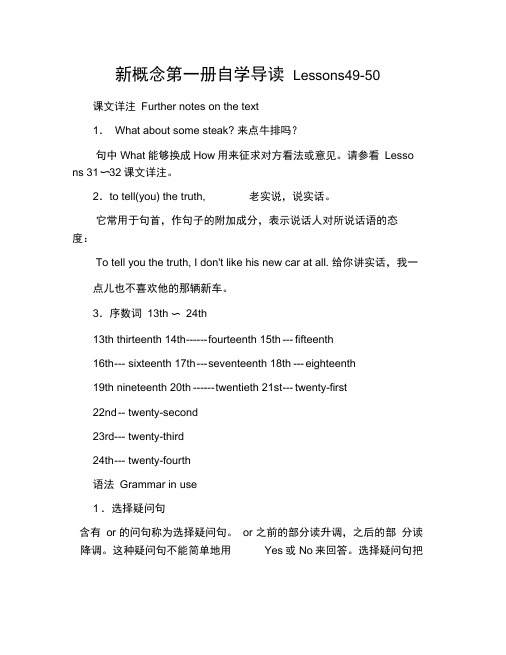
新概念第一册自学导读Lessons49-50 课文详注Further notes on the text1.What about some steak? 来点牛排吗?句中What能够换成How用来征求对方看法或意见。
请参看Lesso ns 31〜32课文详注。
2.to tell(you) the truth, 老实说,说实话。
它常用于句首,作句子的附加成分,表示说话人对所说话语的态度:To tell you the truth, I don't like his new car at all. 给你讲实话,我一点儿也不喜欢他的那辆新车。
3.序数词13th 〜24th13th thirteenth 14th ------ f ourteenth 15th --- fifteenth16th --- sixteenth 17th --- s eventeenth 18th --- eighteenth19th nineteenth 20th ------ t wentieth 21st --- twenty-first22nd -- twenty-second23rd --- twenty-third24th --- twenty-fourth语法Grammar in use1 .选择疑问句含有or 的问句称为选择疑问句。
or 之前的部分读升调,之后的部分读降调。
这种疑问句不能简单地用Yes或No来回答。
选择疑问句把选择的余地缩小在数目有限的事物、行动等上面,能够有无限性的选择、3项选择以及两项选择。
选择疑问句通常能够采用缩略形式,如:Beef or lamb? 牛肉还是羔羊肉?选择疑问句的例句如:What would you like to drink? 你喜欢喝什么?(无限性选择)Which/What would you prefer, tea or coffee? 茶和咖啡,你喜欢哪一种?(两项选择)Would you like tea, coffee, or milk? 你喜欢茶、咖啡、还是牛奶?(3 项选择)How shall we go, by bus or by train? 我们怎么走?乘公共汽车还是坐火车?Did you go there, or didn't you? 你去了那儿还是没有去?Did you or didn't you go there? 你是去了还是没有去那儿?2.一般现在时的单数第 3 人称形式(可参见Lessons 47 ~ 48语法部分。
新概念英语第一册Lesson49-50
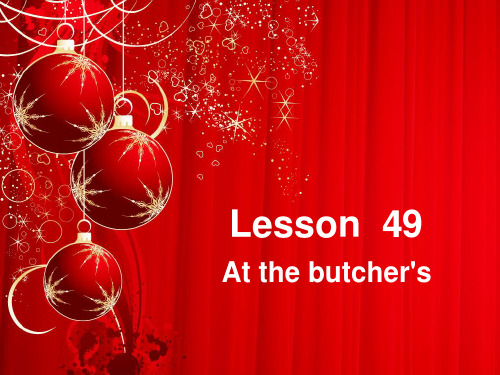
• 1.我喜欢Tank.
• I like Tank. • 2. 她喜欢Tank. • She likes Tank.
• 3. 我不喜欢猫. • I don’t like cat. • 4. 她不喜欢猫. • She doesn’t like cat.
• 5. 你喜欢狗吗? Байду номын сангаас 她喜欢狗 吗? • Do you like dog ? • Does she like dog ?
potato
Page 15
potatoes
cabbage
lettuce
pea
Page 16
bean
pear
grape
peach
Page 17
Grammar
否定和疑问句中加 助动词 do和 does
• do :I/You/We/They like • I/You/We/They don’t like • does :He/She likes • He/She doesn’t like(动词还原)
at the butcher’s 在肉店
Eg: The boy is at the butcher's . He wants to buy some meat .
Page 3
beef 牛肉(不可数)
Eg: Do you want any beef ?
steak 牛排
a piece of steak
Page 9
Mrs. Bird
butcher
What does Mrs. Bird want? She wants some beef, a piece of steak and a pound of mince.
新概念1 lesson49 &50

[læ m] lamb
[steik]steak
[mins] mince
[pɔ:k]
[tʃikən ] chicken n.鸡,鸡肉
pork
• 公鸡 • cock [kɔk]
绵羊 sheep [ʃi:p]
• 母鸡 • hen [hen]
• 小鸡 • chick [tʃik] 单数 • chicken [tʃikən]复数
What about some steak?
=how about 怎么样?/如何? 因为about是介词,所以后面跟名词或者 动名词 你喜欢什么?土豆如何? What do you like ?What about potatoes?
To tell you the truth, I don’t like chicken either.
Have you ever been there?
butcher
At the butcher’s
• [m i: t] meat (食用)肉
• • • • • 是肉类的统称,不可数名词。 你想要一些肉吗? Do you want any meat? 肉丸子 meatball
[bi:f] beef
她喜欢跳舞 She likes dancing .
否定:
She doesn’t like singing.
1. 疑问句将助动词提前
Do / Does + 主语+动词~ 你每天说英语吗? Do you speak English every day? 他每天说英语吗 ? Does he speak English every day?
lamb [læ m] 小羊羔,可数 羊肉,不可数
山羊 goat [gəut]
新概念第一册第49-50课

13
★ chicken n.鸡,鸡肉
Hen 母鸡
Chick
小鸡
cock
公鸡
14
Husband ['hʌzbənd] (丈夫)
(妻子)
Wife
15
★ husband n.老公,丈夫
We are husband and wife. = We are a couple [‘kʌpl] 一对. 夫妻之间的称呼: honey dear darling sweet Baby sweetheart
28
• • • • •
•
•
What about some steak? 来点牛排怎么样? =How about 怎么样?/如何? You look blue. How about a movie? -You don’t like beef? What about pork? Or lamb? He is going to dance. How about you? 搞个聚会怎么样?
at the butcher ’s 在肉店 The man is at the butcher's .
12
• • • • •
I go to the butcher ’s. doctor – the doctor ’s the hairdresser’s 理发店 the dentist牙医 the dentist’s
29
He likes choice apples, but he doesn’t like choice tomatoes.
30
He likes new potatoes, but he doesn’t like new cabbages.
31
新概念课堂笔记 第一册 Lesson 49-50

新概念英语课堂笔记第一册Lesson 49-50husband【用法】n. 丈夫【词组】husband and wife 夫妇tell【用法】v. 告诉;吩咐;讲述;辨别【词组】tell sb. to do sth. 吩咐(告诉)某人做某事tell sb (about) sth. 告诉某人(有关)某事tell sb. a story = tell a story to sb. 给某人讲故事tell the difference between A and B 分辨A 与B之间的不同truth【用法】n. 实情;真相;事实(不可数)【词组】To tell you the truth 实话说【扩展】true adj. 真实的;真正的either【用法】adv. 也(用于否定句)【辨析】also, too, either ——也also 常用在肯定句或疑问句的句中too 常用在肯定句或疑问句的句尾either 常用在否定句的句尾e.g. I also write short stories. 我也写短篇小说Do you also want to have a look? 你也想看看吗?He likes China, too. 他也喜欢中国。
Are you in Grade 3, too? 你也在三年级吗?She is not a Japanese, I’m not, either. 她不是日本人,我也不是。
My sister doesn’t like this song, either. 我妹妹也不喜欢这首歌。
meat 常用肉类名词meat n. 肉fish n. 鱼(肉)beef n. 牛肉pork n. 猪肉mutton n. 羊肉lamb n. 羔羊(肉)chicken n. 鸡(肉)turkey n. 火鸡(肉)steak n. 牛排mince n. 肉馅序数词13th~24th13th----thirteenth 14th----fourteenth15th----fifteenth 16th----sixteenth17th----seventeenth 18th----eighteenth19th----nineteenth 20th----twentieth21st----twenty-first 22nd----twenty-second 23rd----twenty-third 24th----twenty-fourthAt the butcher’s【译文】在肉店【用法】butcher 名词,“卖肉的”,表示一种传统小作坊里的手艺人,要表示他们工作的地点,就是在前面加上the,后面加上–s,要表示在这样的地方,通常用介词at。
新概念第一册Lesson49&50

Do your parents like choice grapes?
•Yes ,they do. They like grapes, but they don’t want any.
Does your grandma like ripe bananas?
Yes,
she does.
She likes ripe bananas, but she doesn’t want any.
husband n. 丈夫 truth
n. 实情
tell the truth
tell v. 告诉
either adv. 也(用于否定句)
Listening comprehension
What does Mr. Bird like?
Text
BUTCHER:
Mrs.Bird? MRS. BIRD: Yes, please. BUTCHER: Do you want beef or lamb? MRS. BIRD: Beef,please. BUTCHER: This lamb's very good. MRS. BIRD: I like lamb, but my husband doesn't .
Practice: The Simple Present Tense
Does the girl like coffee?
No, she doesn’t.
I think she likes tea very much. tea Does the lady like tea?
I’m afraid she doesn’t like tea.
Text
MRS.
BIRD: No, thank you. MRS. BIRD: My husband likes steak, but he doesn't like chicken BUTCHER: To tell you the truth, Mrs. Bird, I don't like chicken either !
新概念英语第一册第49-50课-At the butcher's

新概念英语第一册第49-50课:At the butcher'sLesson 49 At the butcher's在肉店Listen to the tape then answer this question. What does Mr. Bird like?听录音,然后回答问题。
伯德先生喜欢什么?BUTCHER: Do you want any meat today.Mrs. Bird?肉商:您今天要买点肉吗,伯德夫人?MRS.BIRD: Yes, please.伯德夫人:是的,我买一点。
BUTCHER: Do you want beef or lamb?肉商:您要牛肉还是要羔羊肉?MRS.BIRD: Beef, please.伯德夫人:请给我牛肉。
BUTCHER: This lamb's very good.肉商:这羔羊肉很好。
MRS.BIRD: I like lamb,but my husband doesn't.伯德夫人:我喜欢羔羊肉,可我丈夫不喜欢。
BUTCHER: What about some steak?This is a nice piece.肉商:来点牛排吗?这块很好。
MRS.BIRD: Give me that piece, please.伯德夫人:就请给我那块吧。
MRS.BIRD: And a pound of mince, too.伯德夫人:再来一磅绞肉。
BUTCHER: Do you want a chicken,Mrs. Bird?They 're very nice. 肉商:您要买只鸡吗,伯德夫人?这些鸡很好。
MRS.BIRD: No, thank you.伯德夫人:不要了,谢谢。
MRS.BIRD: My husband likes steak,but he doesn't like chicken. 伯德夫人:我丈夫喜欢牛排,但他不喜欢鸡。
新概念英语第一册第49-50课
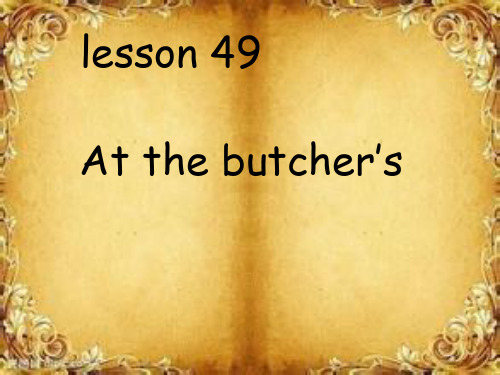
B Answer these questions using I, he or she. 模仿例句回答以下问题,选用I, he或she。 Examples: Does Penny like tomatoes? Yes, she does. She likes tomatoes, but she doesn't want any. Do you like potatoes? Yes, I do. I like potatoes, but I don't want any.
tell:tell sb. sth. 告诉某人某事 tell sth. to sb. 告诉某人某事 tell sb. about/of sth. 向某人讲起
Flash words
• • • • • • • Butcher [‘butʃә(r)] meat [mi:t] beef [bi:f] lamb [lӕm] steak [ steik] mince [mins] chicken [tʃikin]
Do you want a chiken, Mrs. Bird? They are very nice.
可数:(一整只) 鸡 不可数:鸡肉
No, thank you.
My husband likes steak, but hen.
说实话,老实告诉你
To tell you the truth, Mrs. Bird,
Do you like running man?
一般现在时
肯定结构 1.主语 + be +其它. 如:It is cold today. 2.主语 + 动词原形+其它 如:I want an apple. 3.主语 + 动词+s/es(第三人称单数作主语时) 如: She likes apples.
- 1、下载文档前请自行甄别文档内容的完整性,平台不提供额外的编辑、内容补充、找答案等附加服务。
- 2、"仅部分预览"的文档,不可在线预览部分如存在完整性等问题,可反馈申请退款(可完整预览的文档不适用该条件!)。
- 3、如文档侵犯您的权益,请联系客服反馈,我们会尽快为您处理(人工客服工作时间:9:00-18:30)。
新概念第一册自学导读Lessons49-50 课文详注Further notes on the text
1.What about some steak? 来点牛排吗?
句中What能够换成How用来征求对方看法或意见。
请参看Lessons 31 〜32 课文详注。
2.to tell(you) the truth,
老实说,说实话。
它常用于句首,作句子的附加成分,表示说话人对所说话语的态度:
To tell you the truth, I don't like his new car at all.
给你讲实话,我一点儿也不喜欢他的那辆新车。
3.序数词13th〜24th
13th -- thirteenth 14th fourteenth 15th - fifteenth
16th -- sixteenth 17th - s eventeenth 18th -- eighteenth
19th -- nineteenth 20th - twentieth 21st twenty-first
22nd -- twenty-second
23rd -- twenty-third
24th -- twenty-fourth
语法Grammar in use
1.选择疑问句
含有or 的问句称为选择疑问句。
or 之前的部分读升调,之后的部
分读降调。
这种疑问句不能简单地用Yes或No来回答。
选择疑问句把
选择的余地缩小在数目有限的事物、行动等上面,能够有无限性的选择、3 项选择以及两项选择。
选择疑问句通常能够采用缩略形式,如:
Beef or lamb?
牛肉还是羔羊肉?
选择疑问句的例句如:
What would you like to drink?
你喜欢喝什么?(无限性选择)
Which/What would you prefer, tea or coffee?
茶和咖啡,你喜欢哪一种?(两项选择)
Would you like tea, coffee, or milk?
你喜欢茶、咖啡、还是牛奶?(3 项选择)
How shall we go, by bus or by train?
我们怎么走?乘公共汽车还是坐火车?
Did you go there, or didn't you?
你去了那儿还是没有去?
Did you or didn't you go there?
你是去了还是没有去那儿?
2.一般现在时的单数第3 人称形式
(可参见Lessons 47 —48语法部分。
)
词汇学习Word study
1.too adv.
也,还(常用于肯定句,有时也用于疑问句,但不能用于否定句。
常见于句末,而且too 前常有逗号;如果不在句末,too 前后都理应有逗号):
I like lamb, too.
我也喜欢小羊肉。
Can I come, too?
我也来,行吗?
I, too, have been to Shanghai.
我也到过上海。
2.either adv.
也,而且(一般用于否定句,位于句末,前面通常有逗号):
He doesn't like the house, and I don't like it, either.
他不喜欢这所房子,我也不喜欢。
If you do not go, I shall not go, either.
如果你不去,那么我也不去。
I haven't seen the film and my sister hasn't either.
我没有看过那部电影,我妹妹也没看过。
练习答案Key to written exercises
Lesson 50
1 He likes coffee, but I don't.
2She likes tea, but he doesn't.
3He is eating some bread, but she isn't.
4She can type very well, but he can't.
5They are working hard, but we aren't.
6He is reading a magazine, but I am not.
1 Yes, he does.
He likes cabbage, but he doesn't want any. 2Yes, he does.
He likes lettuce, but he doesn't want any. 3Yes, I do.
I like peas, but I don't want any.
4Yes, she does.
She likes beans, but she doesn't want any. 5Yes, I do.
I like bananas, but I don't want any.
6Yes, he does.
He likes oranges, but he doesn't want any. 7Yes, he does.
He likes apples, but he doesn't want any. 8Yes, she does.
She likes pears, but she doesn't want any. 9Yes, I do.
I like grapes, but I don't want any.
10Yes, she does.
She likes peaches, but she doesn't want any.。
